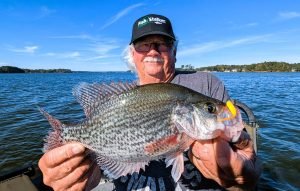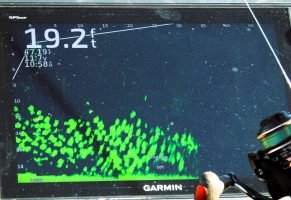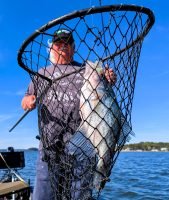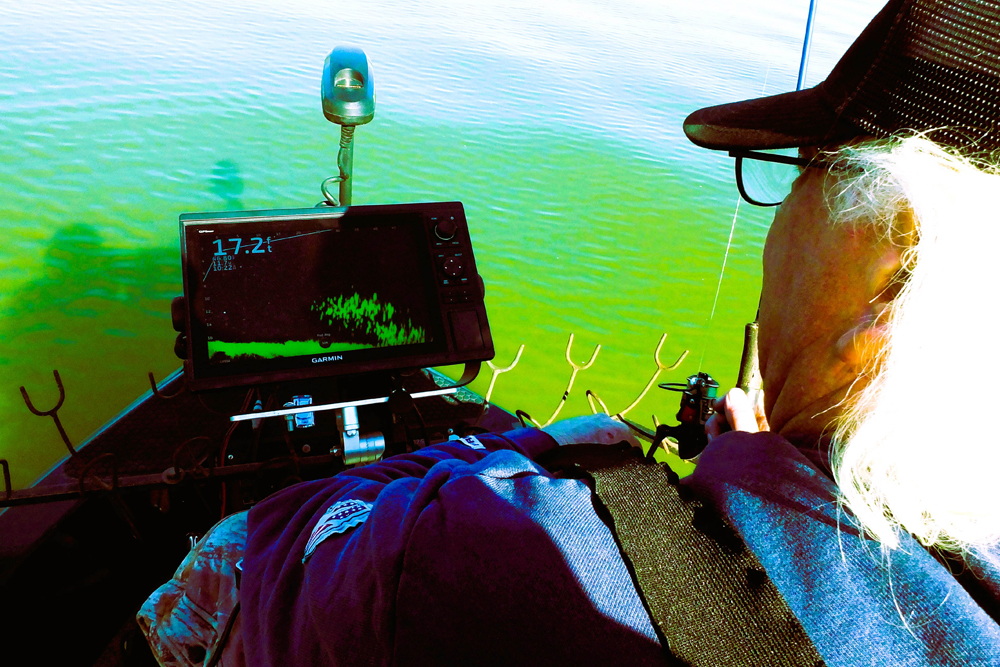Will Hinson works his jig right over the top of a big
school of crappie using FFS to guide his effort.
Is Forward Facing Sonar Right for You?
Story and photos by Terry Madewell
When fish-catching technology leaps forward, anglers watch closely. Once proven effective, the temptation for anglers to incorporate the new technology into their arsenal of tactics is strong.
Such is the case with Forward-Facing Sonar (FFS), a tool that has taken the real-time situational awareness leap, revolutionizing fishing strategy and tactics, especially for crappie and black bass.
Crappie tournament anglers thrive with this tool, and many non-professional crappie anglers are excited about the possibilities it presents – at least those who can afford it.
Many anglers waver because it’s not a low-budget venture, nor is it foolproof. Yet it’s tempting because the potential appears off-the-charts positive.
Is FFS the right choice for you?

Some basic information about FFS is useful, plus some thoughts from a long-time professional angler who successfully transitioned to FFS, about the things he’s learned, and now advises anglers to consider.
FFS is an impressive tool that provides basically an underwater picture of the aquatic world all around your boat, in real time. The screen displays the location of crappie (and other fish) along with their depth and distance from the boat, as well as their proximity to objects such as stumps, brush, or even when roaming in open water.
This tool provides anglers with a view of the crappie’s reaction to a particular lure and presentation. With FFS, guesswork on what lure, depth, and speed is vastly reduced because anglers see the fish’s location and response. When necessary, they can quickly adjust tactics or change lures if they don’t catch the crappie.
Will Hinson is a veteran crappie fisherman and tournament professional from Cassatt, SC, who embraced the technology and challenges of the FFS several years ago. Since then, he has become knowledgeable in the use of FFS and operates (Garmin) Livescope Consulting (843-615-5776), where he sets up, fine-tunes, and teaches the basics to other anglers.
Hinson began crappie fishing 40 years ago, learning the traditional tactics, and competed at a high level in tournaments for years. He’s won multiple events, including the 2021 Crappie USA National Classic at Lake Hartwell, SC.
Hinson has enjoyed success before and after FFS, and when asked if it’s the right tool for everyone, Hinson is adamant that the answer should vary with the individual angler’s goals.
“I transitioned to FFS because I wanted to remain relevant in crappie fishing tournaments,” he said. “In tournament settings where we weigh five or seven fish most of the time, anglers targeting the biggest fish and dedicating time to catching those few but large specimens have a huge advantage. Using FFS enables anglers to instantly tweak their lure choice and presentation based on the crappie’s response.”

Hinson said for his tournament fishing, it’s been a great choice, providing the necessary tool to consistently contend.
But having FFS sonar doesn’t spell the end of tough fishing trips. Hinson said, while it’s a fantastic tool, and seeing the fish react to your presentation is helpful, it does not make the fish bite.
“Sometimes it’s incredibly frustrating to present the lure to crappie, and the fish have no reaction; they just won’t eat it,” he said. “It’s baffling because the day prior, they may have bit on every cast. I want to be clear: the investment of considerable money and time required to learn to use this resource properly doesn’t change the finicky nature of crappie.”
Hinson said by using traditional techniques such as spider rigging, vertical fishing, longline trolling, cast-and-retrieve, and shooting docks, he’ll still catch as many or more crappies as when using FFS.
“Non-FFS electronics that we’ve used for years helps speed up the process of finding the right areas to target, then employing the right tactic produces crappies,” he said.
“I use forward-facing sonar in tournaments to target a few large fish,” he said. “But when taking family or friends, collectively we can often catch more crappie using traditional methods.”
“But when doing that, I have no control over the size of fish I’m targeting,” he said. “As a tournament professional, I need that control. As a crappie fisherman fishing for fun or with friends, I don’t need FFS. Take FFS away, and I’ll still catch scads of crappies.”

A person’s goals and financial outlay are key considerations when considering the use of FFS. It’s not cheap, but it offers capabilities not available without it.
“To become proficient, FFS requires a lot of seat time; hours and days spent in a boat perfecting your personal fishing style using this technology,” he said. “It’s fun, almost like playing a video game, and personally, I enjoy the challenge of seeing fish and then adapting to make them bite on days when they’re finicky. I do use and enjoy it when fishing alone.”
Hinson’s view is that FFS use can be compared to original electronic fish finders when they became available decades ago. An angler who could catch fish without this electronic tool was often more efficient when they learned to use it.
“If you’re just starting, I’d consider learning the basic traditional tactics of crappie fishing, understanding seasonal patterns, and how to employ different lures, and the importance of depth and speed control,” he said. “Then, if you want to level up, you’ll have the background knowledge and FFS can be a great choice.”
Hinson said one way to consider it is when you get to the point where you catch crappie without it and want the challenge of targeting specific fish, one-on-one, go for it.
“If you want to consistently compete at a winning level in modern tournaments, it’s almost essential,” he said. “It’s challenging and fun, and I love watching the screen, but some fishermen don’t enjoy spending hours screen watching. It’s not for everyone.”
FFS is an option, it’s a proven tool to help anglers catch crappie and it certainly fits some angler’s requirements. But it’s not required to catch crappie, fishermen have caught plenty of crappie for generations without it, and they’ll continue to do so.
Terry Madewell of Ridgeway, S.C. has been an outdoor communicator for nearly 50 years. He holds a degree in Wildlife and Fisheries Management and has a long career as a professional wildlife biologist/natural resources manager. He’s passionate about sharing outdoor adventures with others.


